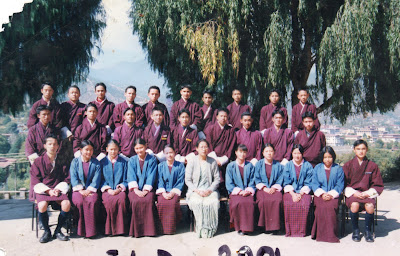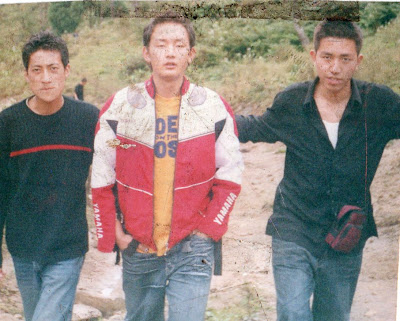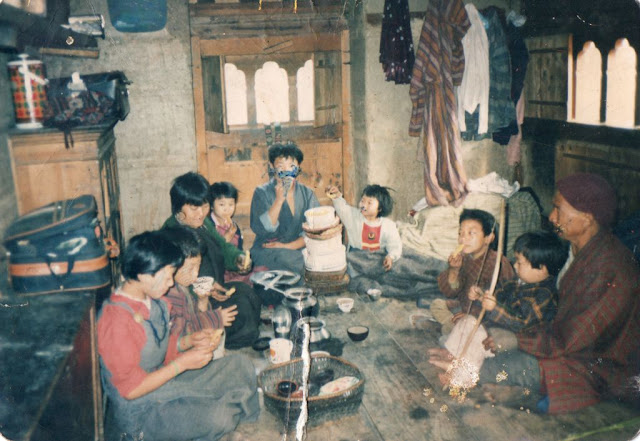 Goods and Services are becoming tougher for the pockets since prices
are constantly on the hike and the farmers on the highways are taking advantage
of the already problematic financial predicament that has struck the citizens
of Bhutan. An innocent citizen’s limited living experiences shared.
Goods and Services are becoming tougher for the pockets since prices
are constantly on the hike and the farmers on the highways are taking advantage
of the already problematic financial predicament that has struck the citizens
of Bhutan. An innocent citizen’s limited living experiences shared.
The mighty Himalayas acted as
tough barriers for this country while the rest of the world was enveloped in
the world wars. The country has been developing and it is prospering under the
Wangchuck dynasty. Each year, Bhutan gets a new and rare species of bird,
animal or a butterfly, discovered in Bhutan; Tourists are flying in, in
thousands; Nature is at her best, as always; Literacy rate and living standards
are on the rise. The pace of development that Bhutan trod is of a high caliber;
Hydro projects are booming and industries too; The government is at full swing
into development; Farmers are rich with their harvest so is the business
community; Civil servants are becoming more professional; Children are in
schools to draw out the best within themselves equipped with GNH infused
curriculum; and the sun and rain does bless the country.
But of late, papers and websites
are overflowing with the news and expressions on the Rupee problem. The general
public know but very less of the actuality of the hitch. Government, aided by
the media, is sharing the information at their best possible speed. The news states of the fundamentality of Indian
National Rupee (INR) situation; the Indian government releasing dollars or
reserves and lots more of its kind. Along
the way, most people are significantly affected by the situation but as anywhere
in the world, a portion of the Bhutanese community is reaping the sweats of the
crisis as an advantageous situation to mint fast profit.
The business community versus their customers:
No doubt that the Ngultrum was leveled at par with the INR for some wise
reasons but the good reasons befall as a curse for the Bhutanese customers, all
due to some kind of un-understandable situation. The INR crisis is making
business profitable like never before; Price of commodities are skyrocketing on
a daily basis with the reason of rupee
deficit. Average Bhutanese customers are always taken for a ride with lame
excuse of rupee situation, day in and day out. The losing battle for customers
is on the go. The position which claimed that customers were the king of the
market and where customers determine the price of goods and services has buried
itself underground. For now, a customer is a blunt knife; it has no effect on
the price factor, at all. The time is in favor of the other side- the sellers.
Price of commodities has slapped the highest, with price increases ranging from
a minimum of cheltrums to a shocking range
of hundreds. Business heightening is taking form at a rapid pace. Business,
both of service and goods, are taking immense pro and raising prices on an
unimaginable rate. House rents take away a huge chunk from the limited income;
Taxi fares are always on the rise like their increase in number. As a concerned
citizen, I am with huge question marks over my head. Is the INR situation really
affecting? How far is it true, for Bhutan? Is there a government agency taking
care of the situation, I mean the price factor? The business community’s
reasons and explanation, Are they revealing the real situation? To be
straightforward, the situation is but worsening day by day. In an era where
money is the most widely used medium of exchange, the value of money is not
valuable at all. The salary remains the same and the prices do not wait for a
salary hike, like in the past. After doing a regular weekend shopping around
the square, we feel as if we have been pick-pocketed, the pockets become thin
within no time. Any person like me with a sole limited income- the monthly salary would feel exactly
the same. All thanks to the ever rising prices of commodities and the rupee
situation. A typical example portraying price rise rate, if stated for
practical explanation:
Customer: Aue, How much does this cost? (Pointing towards a 50 kg rice
bag)
Shopkeeper: (politely answers) It is Nu. 1260. My dear…
Customer: (shocked) Ya-la-ma! Is it not Nu. 960?
Shopkeeper: That was some days back. (Now with in a raised voice)The
price has gone up; we do not get rupee; the banks have many formalities; we
just get Rs. 800 for Nu. 1000; It is hard nowadays to get goods; Oil price has
gone up; Shop rents are raised… and the list goes endless.
Customer: Okay… okay, I’ll take it. (He has to buy the good, whatever
the price may be because his kitchen demands rice for his family… it is a
necessity!)
This development is just a small part from the
situation which is running fast with its swift legs in the country. Likewise,
most goods have seen a rapid rise in their price. The most daring and of high
absurdity is the price hike of home grown or homemade goods. Are we using INR
instead of Ngultrum in Bhutan? Necessities, compared to other goods and
services, become the most exploited items. After all we need them to survive;
the need wins the battle against the price. My view here is not to state that
that the rupee crisis is not affecting Bhutan but I am of the stance that it
does not affect the country as it is assumed or worked out as of now. It is a
accepted truth that shopkeepers earn their living from profits. But, the way of
achieving profit is the question.
A Daylight Raid on the Highways:
It is accurately said that
agriculture is advancement for the rural community and yes, it is proving added
truth and opportunity for villagers selling agricultural products on the (Thimphu-Wangdue)
highways. This is yet another condition affecting the citizens. Mind you, this
situation was born before the INR crisis. It was a concept which was totally
misunderstood. The government’s policy and guidelines of agricultural advancement,
self sufficient ideas, sustainability through agriculture etc has not been able
to find the right ears of the rural community. If I am true, most farmers heard
and comprehended the agricultural wisdom in their own selfish ways. These guiltless yet ambitious farmers thought that the
government is encouraging them to produce agricultural products so as to enable
them to charge highest amounts when selling the harvests come in. The weather
beaten rural face is covered with a broad grin of satisfaction when a traveler stops
by to buy a 5 inch cucumber for Nu 25 and a thin bunch of beans for Nu. 60. The
price of agricultural products has hit the highest crossbar. Farmers are
working hard in their fields, rain or shine, which is of pure Bhutanese dream,
however, the price they charge for their products is unreasonable. I take it
for a daylight raid on the highway. Imagine, a maize head burnt on normal fire,
costing Nu. 40, or a packet of peaches with 5 peaches inside costing Nu. 60. Is
it not open innocent exploitation?
I have many experiences on the
highway vendors but two incidents always dominate my thoughts.
1. It was a hot midday drive from
Thimphu to Wangdue when I stopped at a highway vendor’s stall and asked the
price of chilies. A man not as old as he looked answered that it was Nu. 180
per Kg. The irony was that the price in Thimphu, at centenary market, was Nu
80, on that day and the vendors at Thimphu buy from these farmers to sell it at the centenary market earning a little
bit of profit in the process. I pondered- how on earth this could happen? It
breaks the rule of economics as the selling price is lower than the buying
price, for the Thimphu vegetable vendors. I did not answer the innocent sinner
and drove off.
2. This is yet another
interesting incident about raised price and its frequency. A Sunday morning
with a wonderful sky, I was driving to Thimphu and made a stop at a highway
makeshift stall to buy some fruits along with vegetables. I bought a package of
plums (10-20 pieces) for Nu. 50; I picked four cucumbers, each costing Nu.
25; a thin bunch of broccoli for Nu. 60 and another Nu 60 for 6 peaches.
Just analyze the prices, is it not too much? Much interesting happened the same
evening while I was returning home. I stopped at the same stall as my family
asked for some fruits and vegetables. To my amazement, the prices of the same
goods have gone up by either Nu. 5 or Nu. 10 for same products. I said to
myself… the products have been in the hot summer sun for hours making it
crispier and its weight has been reduced due to fluid loss, thus making it more
valuable and costly. With this, I couldn’t buy even a piece of the cheapest
stuff there.
A green light- Lately, we can see
the highway stalls being upgraded from makeshift sheds to beautiful and
efficient stalls. It is a well-thought venture. With the new stalls, let the
price formulation and speculation be born mutually.
These scenarios are not happening
in the imaginative worlds, it is happening in the land of GNH. The G and N from GNH are not present at all. H is obviously there for the farmers and their affiliates. There is
no question that the INR crisis is a complex situation for a normal Bhutanese
to understand yet we are bearing the crisis along with our friendliest
neighbors. But along the way, the
complex situation is affecting the daily lives of many Bhutanese either through
actual repercussions or through exploitation. We are not concerned with the
actual impacts, it is the law of economics but the latter one, exploitation,
should be observed closely. An out-of-the-box thinking is required for the
situation to improve. We humbly request the concerned agencies to look into
this and enable every Bhutanese to possess the H (happiness) from the GNH, too.


.jpg)































